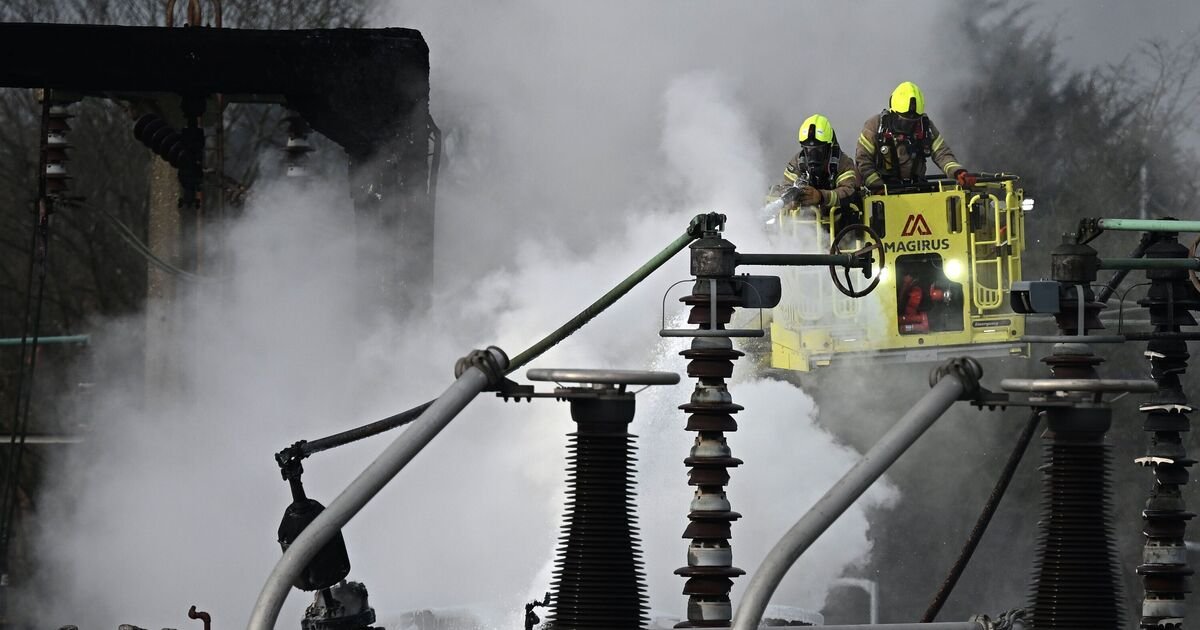The fire at an electrical substation which led to the Heathrow shutdown is not believed to be “foul play”, Ed Miliband has indicated.
At least 1,351 flights were disrupted after Heathrow was closed, with chaos also set to hit airports around the world.
Some 100,000 homes in west London were also without power overnight as 70 firefighters and 10 fire engines battled the blaze on Nestles Avenue in Hayes.
London Fire Brigade said the fire is under control and London Ambulance Service confirmed that there were no casualties.
Fears immediately surfaced that the crisis had been triggered by a Russian sabotage attack. The Kremlin’s spies are known to be recruiting criminals to carry out arson attacks and targeting transport networks.
Asked if foul play could be ruled out, Energy Secretary Mr Miliband told LBC: “There’s no suggestion that there is foul play.” Pressed on whether it was simply a “catastrophic accident”, Mr Miliband said: “The conversation I’ve had is with the National Grid, the chief executive of the National Grid and certainly, that’s what he said to me.”
Mr Miliband said a backup generator that should have powered Heathrow was also damaged in the fire.
However, he said there was a secondary backup and that the National Grid was working to get this online to restore electricity to the airport.
The Cabinet minister told Sky News: “As I understand it from the National Grid, there was a backup generator but that was also affected by the fire, which gives a sense of how unusual and unprecedented it was.
“There is a second backup which they are seeking to use to restore power so there are backup mechanisms in place but given the scale of this fire the backup mechanisms also seem to have been affected.
“But obviously with any incident like this we will want to understand why it happened and what if any lessons it has for our infrastructure.”
Asked by Times Radio if she thought the fire at an electricity substation may have been caused intentionally, Ruth Cadbury, the Labour MP, replied: “I think that’s somewhat speculative.
“There are obviously questions about it, and I don’t know enough about electricity, but for the airport to be dependent on one substation, it does raise questions.”
She added it was “very, very concerning” that “one substation can close down an airport and there isn’t an alternative source of energy”.
Commander Dominic Murphy, Head of the Met’s Counter Terrorism Command, warned a Bulgarian spy ring convicted of spying on an “almost industrial scale” is a “clear example” of Moscow “contracting” out its intelligence gathering to proxies and criminals, adding: “We will see more of that.”
Asked if there were other more spy cells operating in Britain, Commander Murphy said: “The reality is, it won’t be the only activity Russia has conducted here in the UK and we have seen other disruptions into other types of Russian activity.
“Ken McCallum has been very open about the fact that there has been a very regular stream of sabotage and other activities linked to the Russian intelligence services.
“In terms of specific groups, all I can say is that within that 20% demand, there are a number of other investigations linked to Russia but they are not necessarily of this type. We look at lots of international threats.”
MI5 Director General Ken McCallum said Russia and Iran are on a mission to cause “mayhem” with an increase in arson, murder, kidnap and sabotage conspiracies.
The threat Moscow poses on Britain’s streets is “getting worse”, he warned.
Mr McCallum said Russia’s GRU intelligence agency, which was responsible for the Novichok poisonings in Salisbury in 2018, is behind the “sustained mission”, adding that Putin’s “henchmen” are ramping up arson and sabotage operations across Europe “in the misguided hope of weakening Western resolve”.
Britain’s top intelligence officer said Russia and Iran are hiring criminals to carry out their “dirty work” and acting with “increasing recklessness”.
At least 24 alleged saboteurs were arrested last year after being recruited by Russian spy chiefs.
A wave of fires at arms factories and military-related industrial sites in the West has alarmed intelligence chiefs. Suspected plots have been detected in London, Germany, Czech Republic and Sweden.
